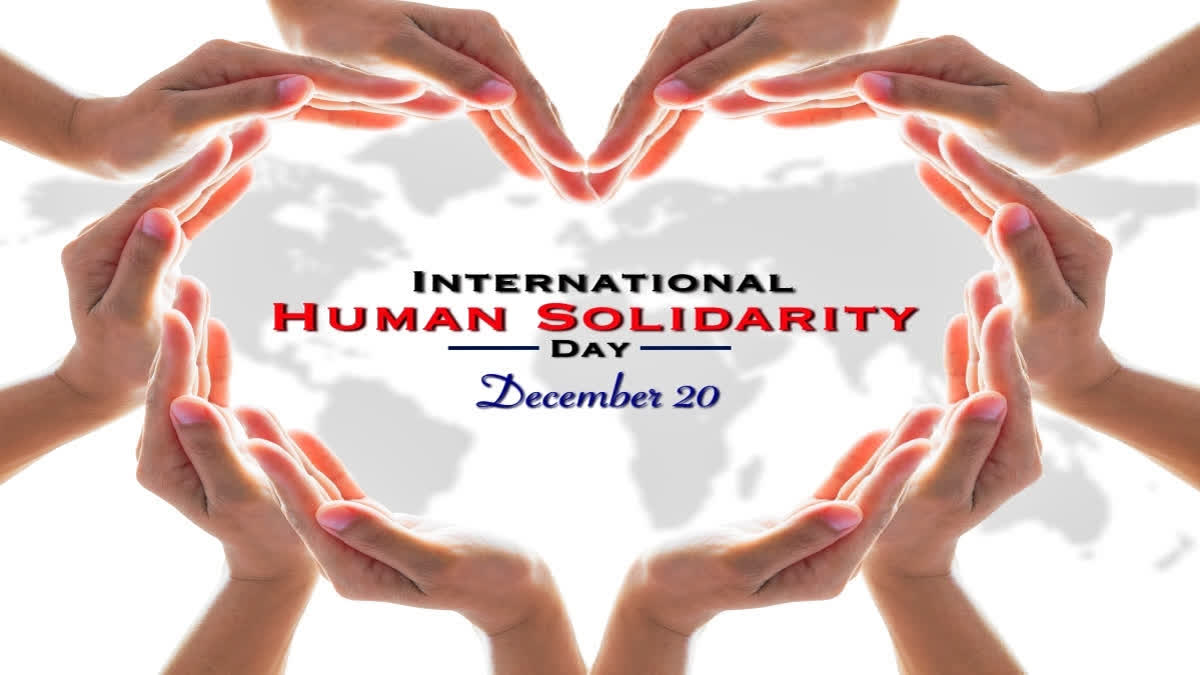International Human Solidarity Day is an annual observance that emphasises the importance of unity, cooperation and shared responsibility in addressing global challenges.
It serves as a reminder that by working together in solidarity, we can create a better world for all and achieve common goals, including peace, social justice, and sustainable development.
Background
Solidarity is identified in the Millennium Declaration as one of the fundamental values of international relations in the 21st Century, wherein those, who either suffer or benefit least deserve help from those who benefit most.
Consequently, in the context of globalisation and the challenge of growing inequality, strengthening international solidarity is indispensable. Therefore, the UN General Assembly, convinced that the promotion of the culture of solidarity and the spirit of sharing is important for combating poverty, proclaimed 20 December as International Human Solidarity Day.
The General Assembly, on 22 December 2005, by resolution 60/209 identified solidarity as one of the fundamental and universal values that should underlie relations between peoples in the twenty-first century, and in that regard decided to proclaim 20 December of each year International Human Solidarity Day.
By resolution 57/265 the General Assembly, on 20 December 2002, established the World Solidarity Fund, which was set up in February 2003 as a trust fund of the United Nations Development Programme. Its objective is to eradicate poverty and promote human and social development in developing countries, in particular among the poorest segments of their populations.
What does human solidarity mean?
Solidarity is a shared sense of responsibility and a commitment to support those in need. First and foremost, human solidarity is founded on mutual respect for each other’s uniqueness, and a deep sense of appreciation of our common humanity – that we are individuals with intrinsic self-worth, and that we are sisters and brothers within one human family inhabiting planet EARTH, our home and our heritage
World Solidarity Fund
The establishment of the World Solidarity Fund was inspired by the spirit of solidarity, as well as the conviction that the international community should pursue an ongoing search for innovative mechanisms to finance poverty eradication and promote social development. The main objective of the Fund is to finance poverty alleviation projects, including initiatives from community-based organisations and small private sector entities in developing countries.
The Fund was formally established by the General Assembly on 20 December 2002, when it endorsed the decision of the World Summit on Sustainable Development (General Assembly resolution 57/265). The General Assembly invites international organisations, the private sector, relevant institutions, foundations and individuals to make voluntary contributions to the Fund.
In Germany, LGBTI people are going online to support marginalised individuals, especially the elderly and the sick. Volunteers are encouraged to take them for walks, as long as they can keep a safe distance and wear a mask. A call chain has also been set up in order to leave no one behind.
In Kenya, popular hip-hop artist Juliani staged an online concert to draw attention to the social inequalities exposed by the COVID-19 pandemic that has caused multiple challenges for the country’s poor.
In India, people have come together to go the extra mile and lend a hand. Several initiatives- from distributing food to migrant workers to buying protective gear for healthcare workers - brought a sense of solidarity among the society.
In the Czech Republic, the Czech Vietnamese community has played a major role during the pandemic by sewing masks and providing free refreshments. In the United States, a New York advocacy group is determined to keep homeless teens off the streets and formerly incarcerated young adults out of jails during the coronavirus pandemic.
Human Solidarity During War
Since Russia’s invasion of Ukraine in February 2022, the World Bank has been working with international partners to mobilise fast-disbursing funds to help the Government of Ukraine sustain critical government services at national and regional levels, including providing essential public services, pensions for the elderly, and social programs for the vulnerable.
The Public Expenditures for Administrative Capacity Endurance (PEACE) Project provides support for the payment of pensions for the elderly, grants to internally displaced persons, and wages for teachers, first responders and emergency services staff. The PEACE project in Ukraine is supported by contributions, including through the URTF, from Austria, Belgium, Canada, Denmark, Iceland, Indonesia, Ireland, Finland, Germany, Japan, the Netherlands, Norway, Latvia, Lithuania, Spain, Sweden, Switzerland, the Republic of Korea, the United Kingdom, and the United States.
In 2024, the European Commission budget amounts to €163 million in humanitarian aid to assist millions of people inside Syria. The EU has regularly allocated humanitarian funding to respond to new emergencies, including following the recent political developments of December 2024, the influx of displaced people from Lebanon in 2024, and the February 2023 earthquakes, as well as to address health needs and the rising food insecurity inside Syria.
In today’s world Solidarity is more crucial than ever. It is the base to tackle major global challenges like health crises, climate change, and inequality. This problem requires collective efforts along with innovative solutions instead of isolated efforts. In today’s world where people tend to neglect more solidarity promotes a shared responsibility, reminding us that our actions have a ripple effect on the larger community.
Everyone should feel included making sure every marginalised voice is heard and no one is left behind in the pursuit of progress. By uniting diverse perspectives, pooling resources, and embracing our shared humanity, solidarity empowers us to address complex issues, build resilient communities, and create a future that is fair, sustainable, and equitable for all.



